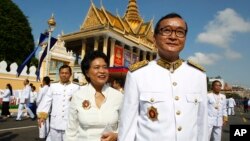An Interior Ministry official said the government was using phone surveillance to track the movements and potential return date for exiled opposition leader Sam Rainsy, who is expected to return to the Kingdom on November 9.
Interior Ministry spokesperson Khieu Sopheak said the government has the capability to find out the exact time and location of Sam Rainsy’s return, as long as opposition members used their phones to communicate with each other. This monitoring and surveillance would help the authorities arrest Sam Rainsy once he entered Cambodian soil, he said.
“Now we know where he is. And even if he returns on the 5th or 6th or 7th or 8th or 9th [of November], we will know it all. Therefore, our preparation is not difficult,” he said.
Sam Rainsy’s potential return has triggered a slew of arrests of opposition members, numbering more than 50 as of this week. The government claims these people have been charged for plotting to mount a coup in the country, after authorities characterized Sam Rainsy’s return as an attempt to overthrow the government.
Sam Rainsy could not be reached via email, but he posted an audio clip on Facebook announcing that he was keeping the location of his return a secret.
Cambodian observers have long expressed concern over the government’s surveillance capabilities. Many have suspected that the routine release of messages, photos and videos from opposition members, often personal information that could be politically embarrassing, was a result of these surveillance operations.
Ly Srey Sros, a political commentator, said the government was admitting to surveilling the opposition members’ phones, a development that was a violation of rights enshrined in the Constitution.
Additionally, she said the authorities should focus on governance, the lack of which is causing disillusionment with the government, rather than expending its resources on arresting opposition members.
“The reason that people have a tendency to not support the government is because of the government’s inability to implement its policies,” she said. “So, I think characterizing people who are not supporting the government as support for a revolution is not correct.”







